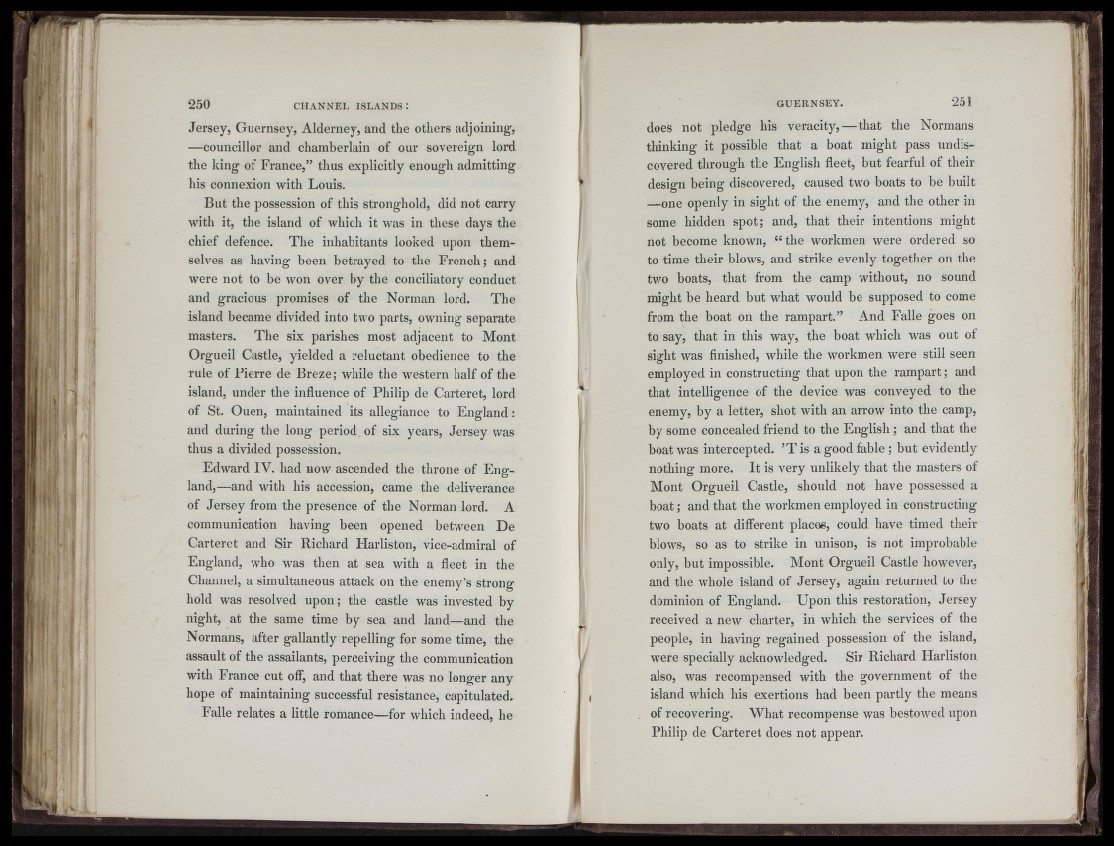
ii
I f : Hi
; I "-I
r M A
1;; E I
I 'r I ■Hfff iM ■ '! - Ell ■ 4 ,
't 1;'
i I
■i i.
V
I ' ; i
I i M ' \K
■H' T
' I I T - J -
Ih
250
Jersey, Guernsey, Alderney, and the others adjoining,
—councillor and chamberlain of our sovereign lord
the king of France,” thus explicitly enough admitting
his connexion with Louis.
But the possession of this stronghold, did not carry
with it, the island of whicli it was in these days the
chief defence. The inhabitants looked upon themselves
as having been betrayed to the French; and
were not to be won over by the conciliatory conduct
and gracious promises of the Norman lord. The
island became divided into two parts, owning separate
masters. The six parishes most adjacent to Mont
Orgueil Castle, yielded a reluctant obedience to the
rule of Pierre de Breze; while the western half of the
island, under the influence of Philip de Carteret, lord
of St. Ouen, maintained its allegiance to England:
and during the long period of six years, Jersey was
thus a divided possession.
Edward IV. had now ascended the throne of England,—
and with his accession, came the deliverance
of Jersey from the presence of the Norman lord. A
communication having been opened between De
Carteret and Sir Richard Harliston, vice-admiral of
England, who was then at sea with a fleet in the
Channel, a simultaneous attack on the enemy’s strong
hold was resolved upon; the castle was invested by
night, at the same time by sea and land—and the
Normans, after gallantly repelling for some time, the
assault of the assailants, perceiving the communication
with France cut off, and that there was no longer any
hope of maintaining successful resistance, capitulated.
Falle relates a little romance—for which indeed, he
does not pledge his veracity, — that the Normans
thinking it possible that a boat might pass undiscovered
through the English fleet, but fearful of their
design being discovered, caused two boats to be built
—one openly in sight of the enemy, and the other in
some hidden spot; and, that their intentions might
not become known, “ the workmen were ordered so
to time their blows, and strike evenly together on the
two boats, that from the camp without, no sound
might be heard but what would be supposed to come
from the boat on the rampart.” And Falle goes on
to say, that in this way, the boat which was out ot
sight was finished, while the workmen were still seen
employed in constructing that upon the rampart; and
that intelligence of the device was conveyed to the
enemy, by a letter, shot with an arrow into the camp,
by some concealed friend to the English; and that the
boat was intercepted. ’T is a good fable ; but evidently
nothing more. It is very unlikely that the masters of
Mont Orgueil Castle, should not have possessed a
boat; and that the workmen employed in constructing
two boats at diiferent places, could have timed their
blows, so as to strike in unison, is not improbable
only, but impossible. Mont Orgueil Castle however,
and the whole island of Jersey, again returned to the
dominion of England. Upon this restoration, Jersey
received a new charter, in which the services of the
people, in having regained possession of the island,
were specially acknowledged. Sir Richard Harliston
also, was recompensed with the government of the
island which his exertions had been partly the means
of recovering. What recompense was bestowed upon
Philip de Carteret does not appear.
4n
! i I i.4;l